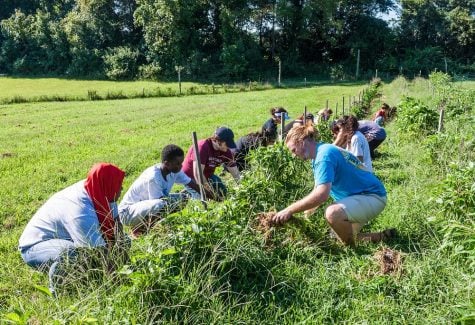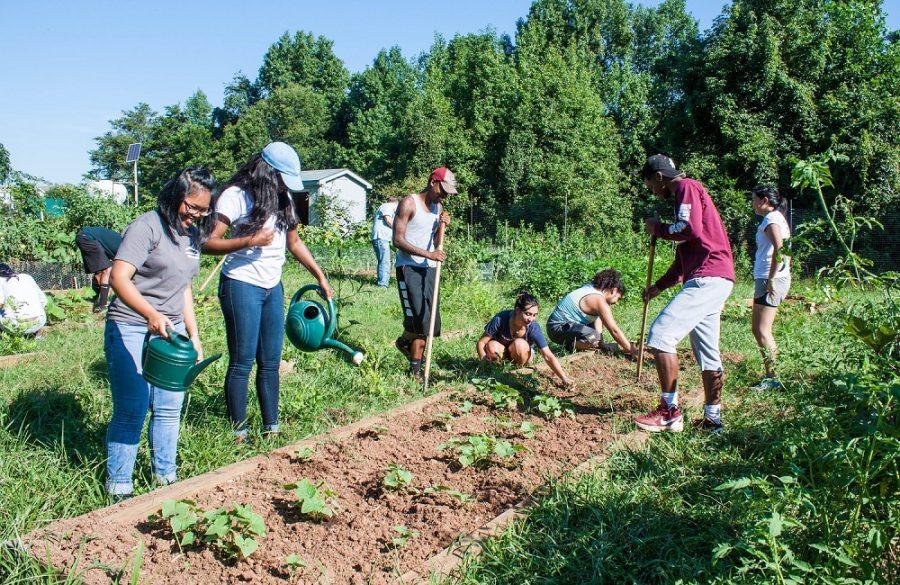Guilford College may soon be growing some environmental superheroes.
A group of enthusiastic students gathered in an environmental science classroom in the Frank Family Science Center on Monday, Oct. 24, to hear about an opportunity they had been waiting for since the beginning of their college careers.
The informal talk and information session hosted by the Department of environmental and sustainability studies discussed the recent approval of a sustainable food systems major, an area of study which will officially become available in spring 2017.
“The impetus for starting the major is the (Guilford) Farm,” said Marlene McCauley, chair of the geology department and professor of geology and Earth sciences, who played a crucial role in introducing this major. “There was so much interest in this (area). I thought it was a crime that there weren’t any classes taught on it.”
To correct this “crime,” the major was considered almost immediately at a faculty meeting. This is a strange phenomenon in comparison to other issues that have been pending approval for years, according to the speakers at the event.
“That tells you something, right?” said McCauley. “At Guilford, this thing is passed right off the bat. It seems like the right thing at the right time.”
The Greensboro community is currently plagued by food scarcity and shortage, and North Carolina is currently ranked as one of the worst states facing a child hunger issue, according to North Carolina Association of Feeding America Food Banks.
“We have the number one food hardship rating, so it was like ‘okay, this (program) is very important,’” said Bronwyn Tucker, sustainability coordinator and visiting lecturer of sustainable food systems.
No other four-year college in North Carolina is said to offer a program comparable to Guilford’s Sustainable food systems major. The program features a study abroad and internship requirements, along with a collection of hands-on artisan courses to provide an interdisciplinary approach. These components are actively being expanded, including potential partnerships with nearby institutions like North Carolina Agricultural and Technical State University.
“You can take a class at A&T that might not be offered here,” said Holly Peterson, co-chair of the environmental studies department and assistant professor of geology. “These could be classes that are co-meets.” The information session held a heavy emphasis on future student involvement with the growth of the new, developing major.
“If it’s not on this list, that doesn’t mean you can’t take it,” said McCauley, pointing at a list of suggested electives for sustainable food systems majors. “The first students (to enroll in this major) are working on how to teach it. They’re co-developers.”
Having independence and control over the education this major will offer them is only a slice of the initiatives these students hope to take.
“After I graduate, I want to continue doing this work, and I want it to be food justice-oriented,” said Sophia Perlmutter, a sophomore and future sustainable food systems major in an informational video about her area of study. “I don’t want to just study for myself but be applying that to our society as a whole.”
Guilfordians with similar ambitions have already been improving the world as part of their education for the upcoming major.
“Without the work that the students do, the farm would feel a little more isolated within the Greensboro 
area,” said Nick Mangili, the farm manager in the Information video. “But because of the ideas that they generate and the models they create to get it out, they’re the ones that are really helping spread the word of how local, regional foods can help the community in addressing food insecurity.”
These students are also looking forward to creating innovative differences in present agricultural systems.
“People are always going to need food, and the system right now is not really going to be able to provide that for the future,” said William Bryer, sophomore and future sustainable food systems major. “Stewardship is also really important, maintaining the earth and soil.”
Guilford’s Quaker values of stewardship are reflected directly onto this study area, carrying messages of managing and preserving resources for future generations.
McCauley perfectly encapsulated the characteristics, values and skills the sustainable food systems major highlights in four words. “It is so Guilford,” she said.












